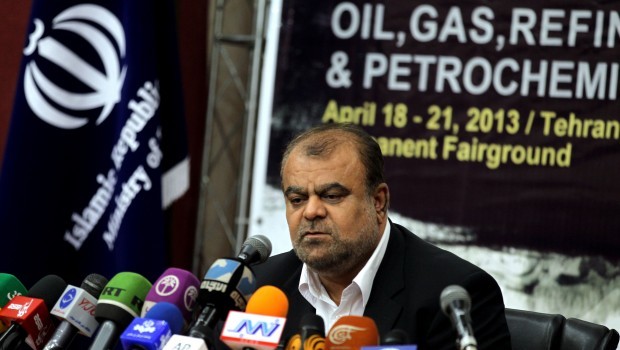
Iranian oil minister Rastam Qasemi speaks during a press conference at the 18th International Oil, Gas, Refining and Petrochemical Exhibition in Tehran on April 20, 2013. (AFP PHOTO/ATTA KENARE)
According to Reuters, in a press conference on the sidelines of an international oil sector exhibition in Tehran the Iranian minister said that during the last meeting of OPEC on December 12, 2012, “Members announced that a price of less than USD 100 per barrel is not fair, and I had decided to call a special meeting if the price dropped below that level.”
Qasemi added, “However, since the next meeting is on May 31 and the price per barrel has not fallen below USD 100 for some time [other than the recent drop], it is not necessary to hold an extraordinary meeting. We will discuss falling oil prices at the next meeting.”
He said that Iran “hopes to keep the price of oil at USD 100,” because this price “aids economic growth, and growth is hindered if prices fall below that minimum level.”
According to the Iranian state television station Press-TV, Qasemi said on Wednesday that OPEC member states will discuss holding an emergency meeting if oil prices remain below USD 100 per barrel: “In the event of falling prices below USD 100 per barrel, we will conduct negotiations with the other members of OPEC to hold an emergency meeting.”
Brent crude, a global benchmark price for oil, fell below the USD 100 mark on April 16. The OPEC Basket Price also fell below the USD 100 mark, closing at USD 98.65 on April 15 and falling steadily to USD 96.35 as of close of trading on Thursday.
The idea of holding an emergency meeting to discuss the drop in oil prices has not received support from the other Gulf states in OPEC.
A Gulf delegate said that there are “just six weeks until the OPEC meeting [on May 31]. I do not think that there will be an emergency meeting before then.” He said he sees no need for such a session before the scheduled meeting in Vienna.
Speaking on Thursday, the Venezuelan energy minister Rafael Ramírez said: “We have been in discussions over whether or not we are going to call a special meeting of OPEC.… We are watching the price of oil, and we’re being careful.”
An Iranian official said that an oil price between USD 100 and USD 120 per barrel is “reasonable.” Iran is facing the harsh consequences of the oil embargo and banking sanctions imposed by Western countries since the beginning of 2012, which aim to force Tehran to halt sensitive nuclear activities.
OPEC estimates that the sanctions led to a decline in oil exports by Iran of between 1 and 1.3 million barrels per day the end of 2012. This resulted in production rates dropping to a quarter of those previously sustained, arriving at less than 3 million barrels per day.
Qasemi did not confirm these figures, saying that “exports fell in 2012 compared to the previous year because the Europeans are not currently purchasing it. Therefore, it is only natural that production rates will drop.”
He said that even with “the isolation from the Europeans, we still have our old customers, and are discussing new contracts with other parties.”
He referenced North Korea in particular, which has been an ally of Tehran since the Islamic Revolution in 1979 and which is also subject to Western sanctions over its nuclear program. Qasemi said that his country is in discussions with its North Korean counterpart. “We hope to reach an agreement” on exporting oil from Iran to North Korea, he said.
The energy minister also confirmed that Tehran would nominate former oil minister Gholam Hossein for the position of OPEC secretary-general, which will be discussed at the annual meeting in May.
The current OPEC secretary-general, Libyan Abdalla El-Badri, had his tenure as head of the organization extended in December last year due to the lack of agreement among member states about who should succeed him.
